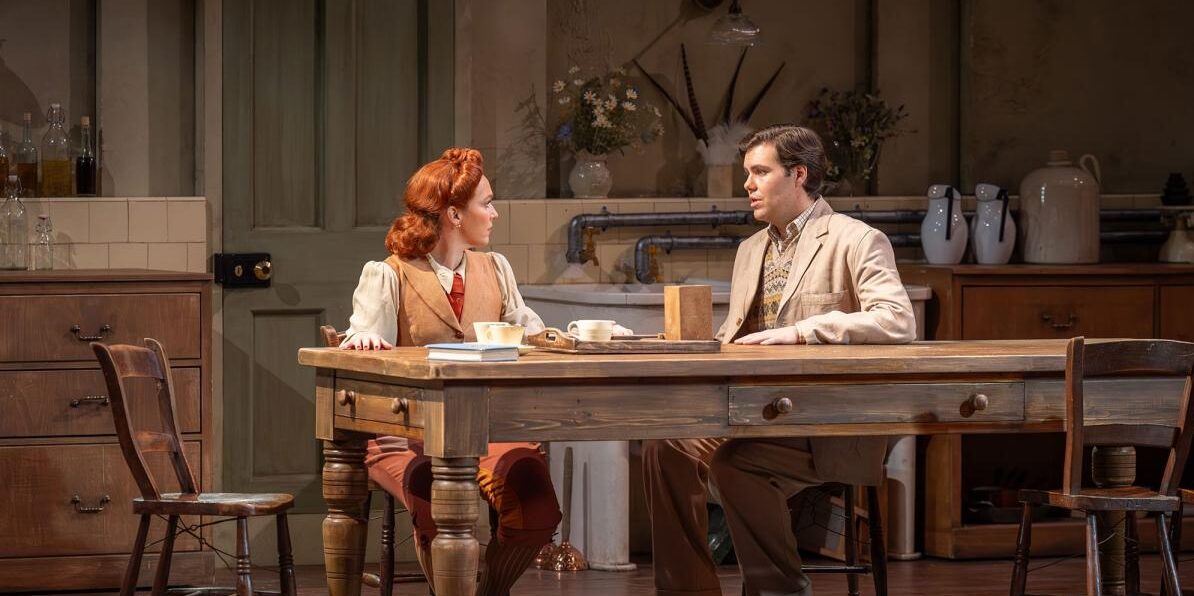Donizetti’s comic opera The Elixir of Love is the quintessential light-touch, bel canto opera buffa. It is a perennial favourite in opera houses all over the world. Donizetti was a prolific composer. Even today only a fraction of his 70 or so operas are regularly performed, among them Lucia di Lammermoor and the Elixir’s buffa partner, Don Pasquale. Last night’s ENO production was directed by Harry Fehr and conducted exquisitely by Teresa Riveiro Böhm. It joins the company’s Jonathan Miller earlier production of Elixir.
Setting the opera in the 1940s England of Foyle’s War was a bold decision, as was casting Adina – sung by Rhian Lois, a flawless, crystal-clear soprano – as the lady of the manor in wartime Britain; here she is prima inter pares among women digging for victory. Nemorino’s tenor part was taken by Thomas Atkins. His rendition of ‘Una furtiva lagrima’ rightly drew huge applause from the audience. His gloriously sweet tenor voice suited this most stylised of operatic roles to perfection.
Given the wartime setting of last night’s Elixir, Nemorino seemed to be a stay-at-home pacifist; not quite the poor peasant of Felice Romani’s libretto but an incongruous toff, dressed in the Armani befitting Cambridge students in Chariots of Fire. In the opera’s original setting, his rival for Adina, Belcore (sung here by Dan D’Souza), is a boastful miles gloriosus, who enters singing the famous baritone aria ‘Come Paride vezzoso.’ In Fehr’s production he is a Royal Air Force brylcreem boy, one of ‘the few’ who had saved the country from invasion: the epic struggle against the enemy was duly played out during the overture in a propaganda cartoon – shades of Chaplin’s 1940 The Great Dictator – projected onto a stage-wide ancient TV. Belcore as an RAF pilot may be stretching interpretative credibility, and it could have worked against poor Nemorino. But then last night’s Belcore was comically bumptious enough for this not to be the case.
Dulcamara (Brandon Cedel) was superb: the part requires a high bass-baritone, and he was very high in the upper registers of the voice; which seemed just right as he swanned through his shyster salesman’s patter. It was as much Gilbert & Sullivan as Donizetti, with the D’Oyly Carte connection jumping off the stage on the back of the late Amanda Holden’s superb translation of Romani’s script. Holden’s libretto surely ranks among the most inspired adaptations of any in English: only someone with her musician’s ear for sound and vocals could produce a libretto in which the glories of English verse chime seamlessly with the intrinsic vowel music of Italian.
The challenge of performing famous Italian operas in English is the remit of the ENO, to introduce fresh audiences to the magic that is opera and to break down linguistic barriers of understanding; in fact to experience this great art form natively. The ENO has been a trailblazer in this respect for many years now. The comedy of Dulcamara’s pitching his magic potion – red wine (what else) and a 1931 vintage at that – thrilled the audience. Who could deny, Dulcamara’s tricksiness notwithstanding, that there is indeed as much veritas as Dutch courage in vino; in moderation, of course, and here aided and abetted by Nemorino’s rich-as-Croesus uncle dying in the nick of time, to leave him a millionaire.
The chorus and the soloists interacted fluidly on the very large stage of the Coliseum. For a first opera there can be few more enjoyable nights out in London right now than this lyrical production of an established, endlessly melodious masterpiece.
Music by Gaetano Donizetti (1756-1791)
Libretto by Felice Romani with translation into English by Amanda Holden
Conductor: Teresa Riveiro Böhm
Director, Harry Fehr
Cast includes: Thomas Atkins, Rhian Lois, Dan D’Souza, Brandon Cedel
Until: 5 December 2024 (8 Performances)
Photos by Marc Brenner

